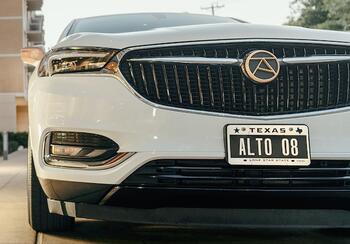
Alto is a rideshare company that was founded in Dallas and so far is also operating in Houston, Los Angeles, Miami, San Francisco, and Washington. The company differs from traditional rideshare operations like Uber and Lyft in that it owns all of its automobiles and all of its drivers are employees, not contractors. This is supposed to make it more attractive to passengers, especially women, who may be squeamish about riding in a stranger’s car.
Alto claims that its rides are “elevated” above other ridesharers. Its fleet currently seems to consist of Buick Enclaves, a cross-over with three rows of seating. It has replaced the Buick logo on the grill with its own and added its logo to other parts of the vehicles as well. However, it plans to transition soon to all-electric vehicles.
While I’m always intrigued by new business models, I can’t help but feel this one is going in the wrong direction. The intercity bus market went from Greyhound, which owned its own buses, stations, and maintenance facilities, to Megabus, which owned buses and maintenance facilities but no stations, to Flx, which didn’t even own its own buses and maintenance facilities. In other words, the newer models shed costs and spread the risk to more operators.
Uber and Lyft disrupted the taxi market because they replace call centers and human taxi dispatchers with smart phones and automated dispatch. In 2019, some predicted that Uber would never be profitable, but it had its first profitable quarter in 2021 and today both Uber and Lyft claim to be making a profit.
Uber and Lyft have been criticized for treating drivers as contractors and not employees, yet most taxi companies do the same. Uber and Lyft may make less effort than taxi companies to ensure uniformity of service, as not all drivers own the same make and model of vehicles, but it has been my experience, at least, that vehicles are clean, in good condition, and relatively new. The drivers, not Uber or Lyft, take the risk that the vehicles they own won’t earn enough to pay for themselves, but from the customer’s viewpoint that leads to more competition and faster service.
Alto’s model absorbs all of the risk that Uber and Lyft spread among their drivers. That could be quite expensive. Buick Enclaves list for about $45,000, and while I’m sure Alto gets quantity discounts, the $60 million it had raised by mid-2021 is hardly enough to buy 3,000 Enclaves, much less replace them all with electric vehicles by the end of this year, which was Alto’s goal.
Given the limited number of vehicles in its fleet, Alto won’t promise 5-minute wait times like Uber and Lyft can often do. While people can pre-schedule a car, spontaneous Alto customers can expect to wait 10 to 15 minutes. Also, Alto doesn’t operate 24 hours a day; instead, depending on the city, it is shut down for three to five hours each night. Furthermore, while Uber and Lyft are available in hundreds of U.S. cities, Alto is currently limited to just six, which means frequent travelers will keep the Uber and/or Lyft apps even after they’ve tried Alto. Another disadvantage is that all of Alto’s fleet of cars have to be big enough to carry the largest party that might want to use them (i.e., six passengers), while Uber and Lyft can tailor the size of the vehicles they send to the number of people in each party.
Read the rest of this piece at The Antiplanner.
Randal O'Toole, the Antiplanner, is a policy analyst with nearly 50 years of experience reviewing transportation and land-use plans and the author of The Best-Laid Plans: How Government Planning Harms Your Quality of Life, Your Pocketbook, and Your Future.
Photo: courtesy Alto.













funders
Alto's big funding outside of Texas is from Franklin Templeton, which is experiencing its own pressures.